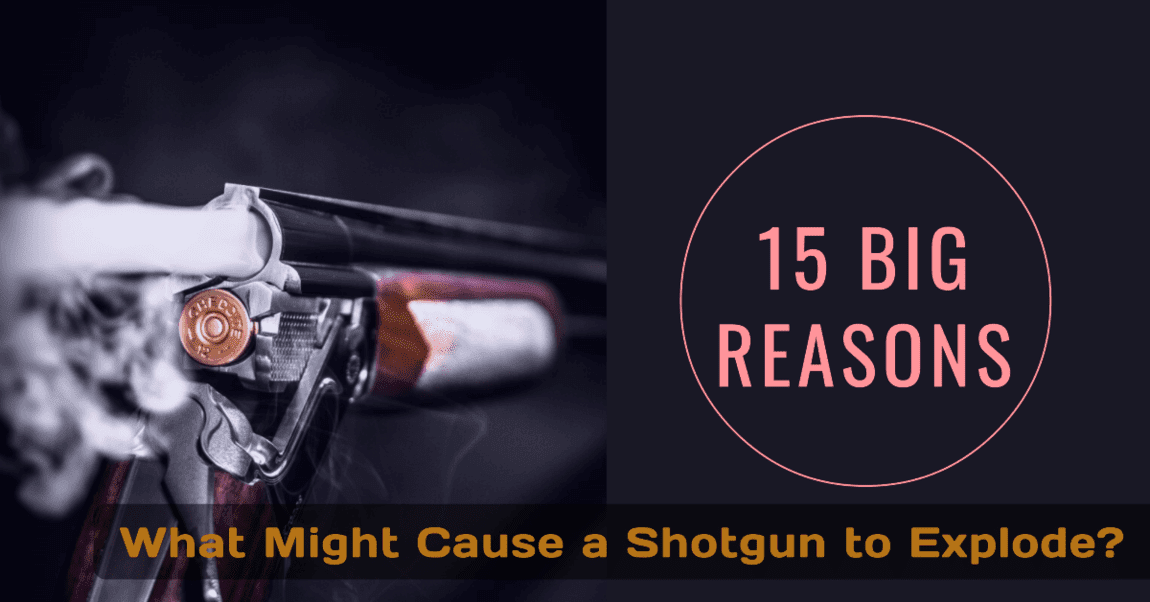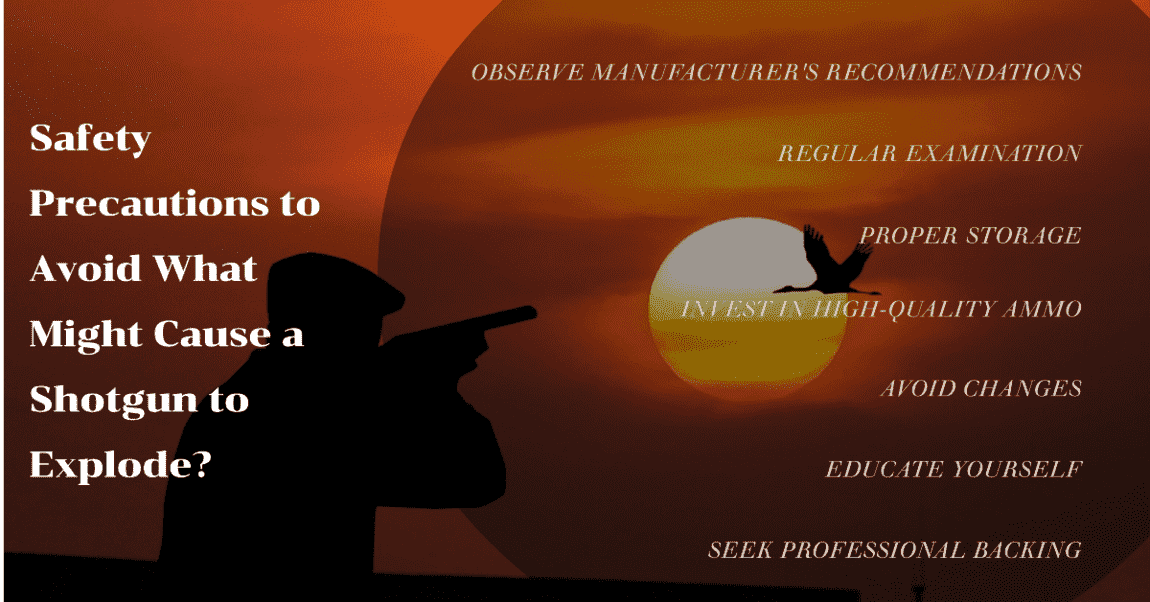Shotguns are universal firearms that can be used for hunting & sport shooting. still, like any mechanical instrument, they can fail & catalyze serious injury. Gun Owners & enthusiasts need to understand what might cause a shotgun to explode to prevent accidents.

Why did my Shotgun barrel explode?
Shotguns (Handguns) are sophisticated weapons with precise engineering for secure & precise use. Shotguns are engineered to withstand heavy & close use, but they can malfunction or break down for several reasons, leading to the strange but startling frequency of shotgun explosions. We’ll examine the many factors that could result in “what might cause a shotgun to explode” in this thorough blog post, along with safety precautions & best practices.
15 Reasons: What Might Cause a Shotgun to Explode?
1. Overloaded Ammunition
Using ammunition that exceeds the recommended pressure limits can spell disaster for a shotgun. This practice rise the question “What Might Cause a Shotgun to Explode?”. When the fuel charge generates further pressure than the shotgun can handle, it may lead to disastrous failures within the arm’s chamber & barrel.
2. Barrel Obstructions
Foreign items, detritus, or even an incorrectly placed wad might hinder the typical course of the discharged pellets in a shotgun barrel. Firing a shotgun with a clogged barrel might result in excessive pressure buildup, which could end in an explosion.
3. Corrosion and Rust
Neglected shotguns with rust & corrosion might have decreased structural integrity over time. Rust can eat away at the barrel walls, resulting in thin places that are more prone to bursting when discharged.
4. Damaged Firing Pin
Misfires or delayed firing can arise from a damaged or broken firing pin, leading to partial ignition of the propellant. However, heat & pressure build up within the chamber, adding the chance of an explosion, If the blasting pin connects the primer numerous times.
5. Improper Handloading
Handloading, the practice of creating custom ammunition, requires perfection & adherence to established guidelines. Swinging from recommended measures for powder, shot, & wad elements can lead to inordinate pressures upon firing.
6. Using Incorrect Ammunition
Using the incorrect ammo in a shotgun can have devastating results and arise the question “What Might Cause a Shotgun to Explode?”. Shotguns are built to take various gauges and shell lengths. Incompatible ammunition might generate a pressure buildup that exceeds the capability of the shotgun.
7. Poor Maintenance
For weapon safety, regular maintenance is essential. Failure to clean, lube, & examine a shotgun might result in unanticipated problems. When firing a filthy or neglected shotgun, anomalous pressure spikes may occur.
Also Read: From Pencils to Pixels: What is 2D Movie & What is 4DX 2D Movie?
8. Manufacturing Defects
Manufacturing flaws in shotguns are possible in rare circumstances. These flaws might jeopardize the firearm’s integrity, making it more prone to malfunctions & explosions.
9. Extreme Temperatures
Extreme temperatures, whether hot or cold, can affect the metallurgical grades of a shotgun’s elements. This, in turn, can affect how the shotgun manages pressure, maybe influencing in explosions.
10. DIY Modifications
Modifying a shotgun without proper knowledge and skills can be dangerous. Modifications that affect the chamber, barrel, or internal building blocks can lead to irregular pressure patterns & disastrous failures.
11. Poor Quality Ammunition
Inconsistent propellant distribution may occur in low-quality or badly kept munitions. When using such ammo in a shotgun, unequal pressure buildup might occur, increasing the chance of an explosion.
12. Wear and Tear
A shotgun’s factors experience wear over time, affecting how the arm handles pressure. Regularly used shotguns with worn-out corridor may be more susceptible to explosive incidents.
13. Incorrect Assembly
Improperly assembling a shotgun after cleaning or maintenance might result in serious mistakes. When the shotgun’s components are not properly aligned, aberrant pressure distribution might occur.
14. Water Damage
Rust & corrosion can result from exposing a shotgun to water without sufficient drying & maintenance. Water can enter the barrel & chamber, causing pressure dynamics to change.
15. Environmental Factors
High humidity, for example, can affect ammo & the shotgun itself. Humidity can have an impact on propellant performance, perhaps resulting in pressure imbalances.
Also Read: The Ultimate Clash of Titans: 45 Colt vs. 44 Magnum
Safety Precautions to Avoid What Might Cause a Shotgun to Explode?

- Observe manufacturer’s Recommendations: Always follow the manufacturer’s suggested ammo & conservation practices.
- Regular examination: Check your shotgun regularly for symptoms of erosion, wear, & damage.
- Proper Storage: To avoid erosion & damage, keep your shotgun in a dry, cold terrain.
- Invest in high-quality ammo: Purchase high-quality ammo from reputed producers.
- Avoid changes: Unless you’re a competent gunsmith, avoid making changes.
- Educate Yourself: If you intend to reload ammo, learn about correct handloading ways.
- Seek Professional backing: Consult an authentic gunsmith if you suspect a problem with your shotgun.
Short History of Shotgun
The shotgun has a long history, beginning in 11th century China as an enormous bumbler that fired numerous bullets. True shotguns with smoothbore barrels appeared in 16th-century Europe, followed by 18th-century rifled shotguns, which enriched accurateness. The nineteenth century saw advancements like stronger cartridges & fruitful reloading, which increased hunting, sport, & military appeal. Pump-action & semi-automatic performances gained fashionability over the twentieth century. Presently, several shotgun types meet multi-hued purposes, similar to pump-action for responsibility & price, semi-automatic for speed, & over-and-under for rigidity. The long history of this weapon has assured its ongoing appeal in a variety of uses.
Also Read: The Truth Behind Why Does 5G Sucks?: Myths, Facts & Reality Unveiled
My Final Thought: What Might Cause a Shotgun to Explode?
Understanding What Might Cause a Shotgun to Explode? is critical for gun owners & enthusiasts. You may reduce the dangers connected with such occurrences by following safety standards, utilizing quality ammo, & properly servicing your shotgun. Always put safety & proper weapon ownership first.
FAQ’s
How long does a shotgun barrel last?
The endurance of a shotgun barrel is determined by elements matching its type, material, & frequency of use. Well-maintained barrels generally endure for years. Smoothbore barrels last longer than rifled barrels, steel barrels are more durable than aluminum barrels, frequent operation causes brisk wear, & applicable maintenance via regular cleaning & lubrication. Following maintenance guidelines such as aspect-use cleaning, using soft cleaning strategies, & avoiding harsh chemicals will help to extend the life of a barrel. The normal lifespan is 10,000 to 20,000 rounds, but with proper maintenance, it may be major longer. However, you should visit a gunsmith, If you’re anxious.
How strong is a shotgun barrel?
Shotgun barrel strength depends on gauge, material, and length, with larger gauges and steel barrels being stronger. Manufacturing quality also matters as well-made barrels stabilize shots. While shotgun barrels are generally robust, overheating, improper cleaning, and physical damage can weaken them. Consulting a gunsmith is advisable if concerned about barrel strength.
How long can you keep shells in a shotgun?
Shotgun shell longevity depends on type, storage conditions, and use frequency. Properly stored, they can last several years, but factors like heat, cold, and moisture can shorten lifespan. Frequent use also wears shells out quickly. To ensure longevity, store shells in a cool, dry place, away from heat and sunlight, and inspect for damage periodically. Original packaging is ideal. Shells typically last 5 to 10 years, but some may endure longer. For prolonged gun inactivity, empty shells and store them separately to prevent damage.
Is it safe to shoot an old shotgun?
The safety of an old shotgun is determined by elements such as age, condition, & ammunition type. Shotguns that have been neglected or incorrectly kept might be dangerous. Examine the vehicle for rust, fractures, missing components, degraded seals, & old shells, all of which might jeopardize safety. When in doubt, have a gunsmith evaluate it. Wearing protective equipment, avoiding pointing at anything important, keeping fingers off the trigger, & maintaining a clean line of fire are among shooting safety guidelines. Following these instructions ensures that vintage shotguns are used safely.


How come your every vlog is so creative?
How come your every blog is so creative?
How come your every blog is so creative